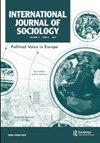Coding Issues of Open-Ended Questions in a Cross-Cultural Context
IF 1.1
Q2 SOCIOLOGY
引用次数: 1
Abstract
Abstract Although cross-cultural surveys increasingly use open-ended questions to obtain detailed information on respondents’ attitudes, the issue of coding quality is rarely addressed. These questions are always challenging but even more so in multilingual, cross-cultural research contexts as the different survey languages make response coding more difficult and costly. In this paper, we examine coding issues of open-ended questions and the impact of translation on coding results by comparing codings of translated responses (two-step approach with translation and coding) with codings of the same responses in the original languages (one-step approach using bilingual coders). We draw on data from the project CICOM, specifically respondents’ answers in English and Spanish to open-ended questions about the meaning of left and right. Our goal is to determine whether the coding approach makes a difference to data quality and to identify error sources in the process. Positive news is that both coding approaches resulted in good quality data. We identify several error sources related, first, to respondents’ short answers; second, to the translation process; and third, to the coding process. The response context and the cultural background of translators and coders appear to be important.跨文化背景下开放式问题的编码问题
尽管跨文化调查越来越多地使用开放式问题来获取受访者态度的详细信息,但编码质量的问题很少得到解决。这些问题总是具有挑战性的,但在多语言、跨文化的研究背景下更是如此,因为不同的调查语言使响应编码变得更加困难和昂贵。在本文中,我们通过比较翻译答案的编码(两步法与翻译和编码)与原始语言相同答案的编码(一步法使用双语编码器),研究了开放式问题的编码问题以及翻译对编码结果的影响。我们利用CICOM项目的数据,特别是受访者对“左”和“右”含义的开放式问题的英语和西班牙语回答。我们的目标是确定编码方法是否对数据质量产生影响,并确定过程中的错误来源。好消息是,这两种编码方法都产生了高质量的数据。我们确定了几个错误来源,首先,与受访者的简短回答有关;二、对翻译过程的把握;第三是编码过程。译者和编码员的回应语境和文化背景似乎很重要。
本文章由计算机程序翻译,如有差异,请以英文原文为准。
求助全文
约1分钟内获得全文
求助全文

 求助内容:
求助内容: 应助结果提醒方式:
应助结果提醒方式:


